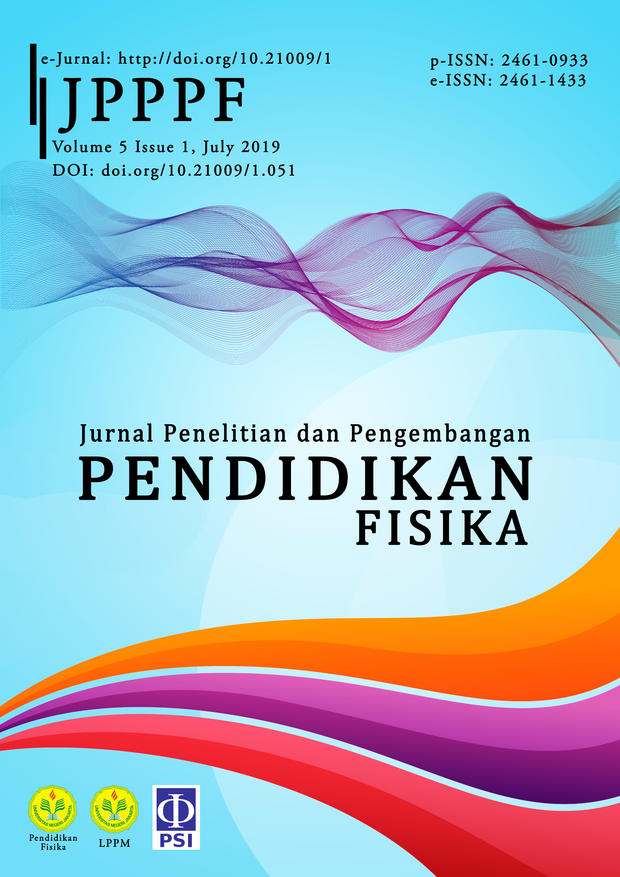Improving Students’ Performance by Using Science Process Skills in The High School’s Physics Curriculum Grade X in Indonesia
DOI:
https://doi.org/10.21009/1.05105Keywords:
Science Process Skills (SPS), Physic Curriculum, Grade X, IndonesiaAbstract
Teaching physic in high schools is very challenging, especially where the teachers understanding of the concept and teaching methods is still limited. It needs an effort to make the teaching more exciting experience for students. This study, therefore, aims to investigate the application of Science Process Skills (SPS) as the scientific skills that can be used to develop and increase science process skills and understanding of physics subject through laboratory activity. This study utilizes experimental design by involving students grade X from Senior High School (SMA) 1 Banda Aceh academic year 2018/2019 as a sample. It follows the competency standard of 2013 Indonesian Curriculum. This study found that there is a positive correlation between the content of the physics syllabus and the science process skills. This condition has contributed positively to the learning achievements of students. The result of pre-and post-test shows the result of post-test has improved after applying this approach. Hence it is recommended that science Process Skills can be promoted as a tool to improve the ability of students in understanding the science concept within the physic, as well as other science subjects.
References
Ratnasari, D., Sukarmin, S., Suparmi, S., & Harjunowibowo, D 2018, ‘Analysis of Science Process Skills of Summative Test Items in Physics of Grade X in Surakarta’, Jurnal Pendidikan IPA Indonesia, vol. 7, no. 1, pp. 34-40.
Duda, H. J., Susilo, H., & Newcombe, P 2019, ‘Enhancing Different Ethnicity Science Process Skills: Problem-Based Learning through Practicum and Authentic Assessment’, International Journal of Instruction, vol. 12, no.1, pp. 1207-1222.
Durmaz, H 2016, ‘The effect of an instructional intervention on enhancement pre-service science teachers' science processes skills’, In Asia-Pacific Forum on Science Learning & Teaching, vol. 17, no. 2.
German, J. P 1991, ‘Developing Science Process Skills through Directed Inquiry’, The American Biology Teacher, vol. 53, no. 4, pp. 243-247.
Hamalik 2009, ‘Kurikulum dan Pembelajaran’ Jakarta: Bumi Aksara.
Hodosyová, Ú., Monikavanyová, V., & Lapitková 2015, ‘The Development of Science Process Skills in Physics Education’, Procedia - Social and Behavioral Sciences, vol. 186, pp. 982-989.
Jeenthong, R., & Sriwattanarothai 2014, ‘Promoting Integrated Science Process Skills through Betta-live Science Laboratory’, Procedia - Social and Behavioral Sciences, vol. 116, pp. 3292-3296.
Khan, M., & Iqbal, M. Z 2011, ‘Effect of Inquiry LabTeaching Method on the Development of Scientific Skills Through the Teaching of Biology in Pakistan’, Language in India, vol. 11, no.1, pp. 169-178.
Kristianti 2012, ‘Pembelajaran IPA dengan Inkuiri Bebas Termodifikasi Menggunakan Lab Riil dan Lab Virtuil ditinjau dari Kemampuan Berpikir dan Gaya Belajar Siswa’, Jurnal Inkuiri. vol. 1, no. 2, pp. 105-111.
Maradona 2013, ‘Analisis keterampilan proses sains siswa kelas XI IPA SMA Islam Samarinda pada pokok bahasan hidrolisis melalui metode eksperimen’, Presidium Seminar Nasional Kimia 2013, pp. 62-70.
Ministry of Education 2013, ‘Basic Competencies Sekolah Menengah Atas (SMA)/Madrasah Aliyah (MA)’, Ministry of Education Republic of Indonesia, Jakarta.
Padilla, M. J 1990, ‘The science process skills’, Research Matters-to the science Teacher, vol. 9004.
Praptiwi et.al. 2012, ‘Evektivitas Metode Kooperatif Tipe GI dan STAND ditinjau dari Kemampuan Awal’, Jurnal Penelitian Pembelajaran Fisika, vol. 3, no. 1.
Semiawan 1992, ‘Pendekatan Keterampilan Proses, Bagaimana Mengaktifkan Siswa dalam Belajar’, Jakarta: Gramedia Sarana Indonesia.
Sesen, B & Tarhan, L 2013, ‘Inquiry-based laboratory activities in electrochemistry: high school students’ achievements and attitudes’, Research in Science Education, vol. 43, no. 1, pp. 413-435.
Sukemi & Andriono 2014, ‘Peta Jalan Kurikulum 2013’, Pusat Informasi dan Hubungan Masyarakat, Kemendikbud, Jakarta.
Wiwin & Kustijono 2018, ‘The use of physics practicum to train science process skills and its effect on scientific attitude of vocational high school students,’ Journal of Physics: Conference Series, vol. 997, issue 1, article id. 012040.
Yuniyanti, E. D. & Sunarno, W. H 2012, ‘Pembelajaran Kimia Menggunakan Inkuiri Ter- bimbing dengan Media Modul dan E-Learning ditinjau dari Kemampuan Pemahaman Membaca dan Kemampuan Berpikir Abstrak’, Jurnal Inkuiri, vol. 1, no. 2, pp. 112-120.











